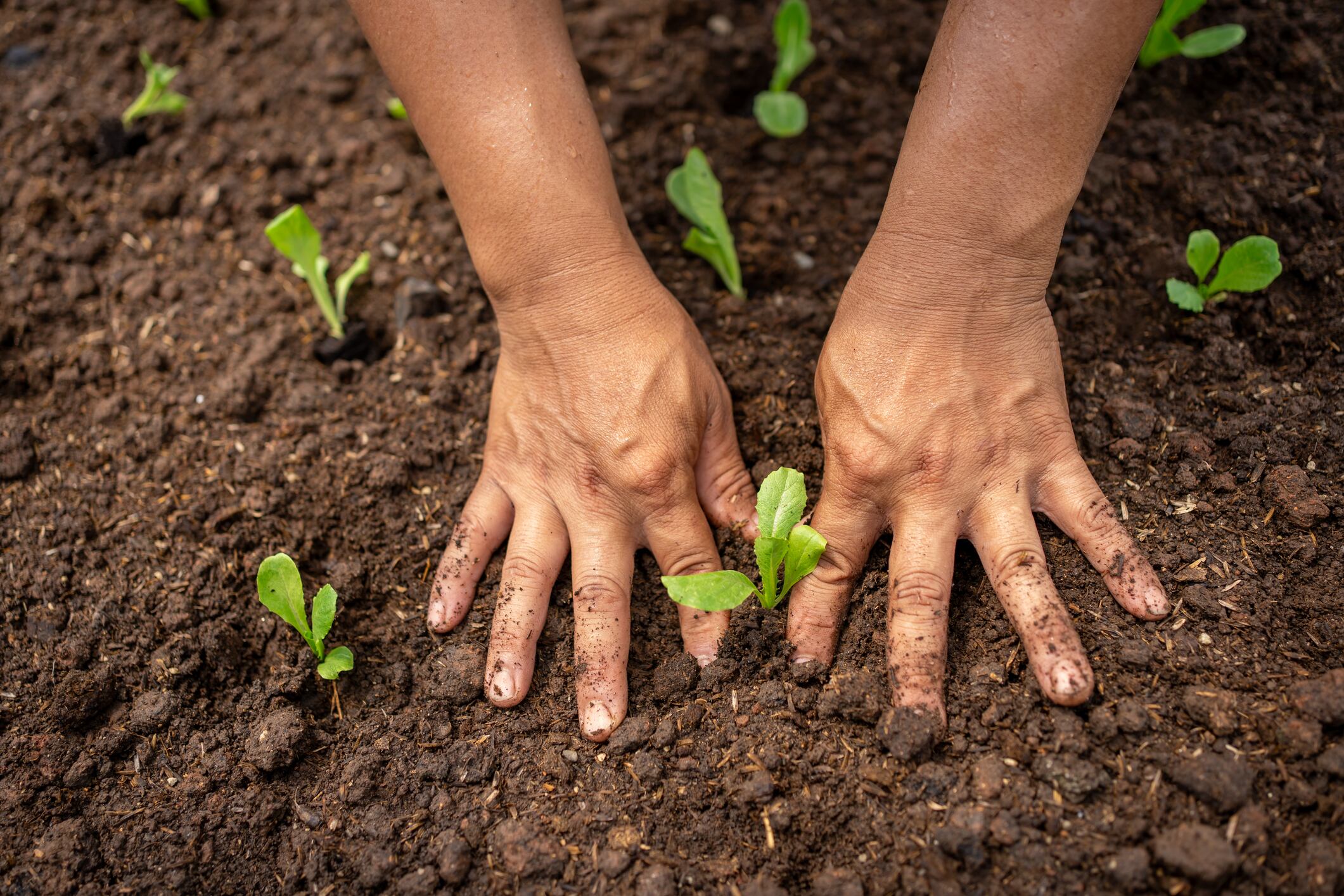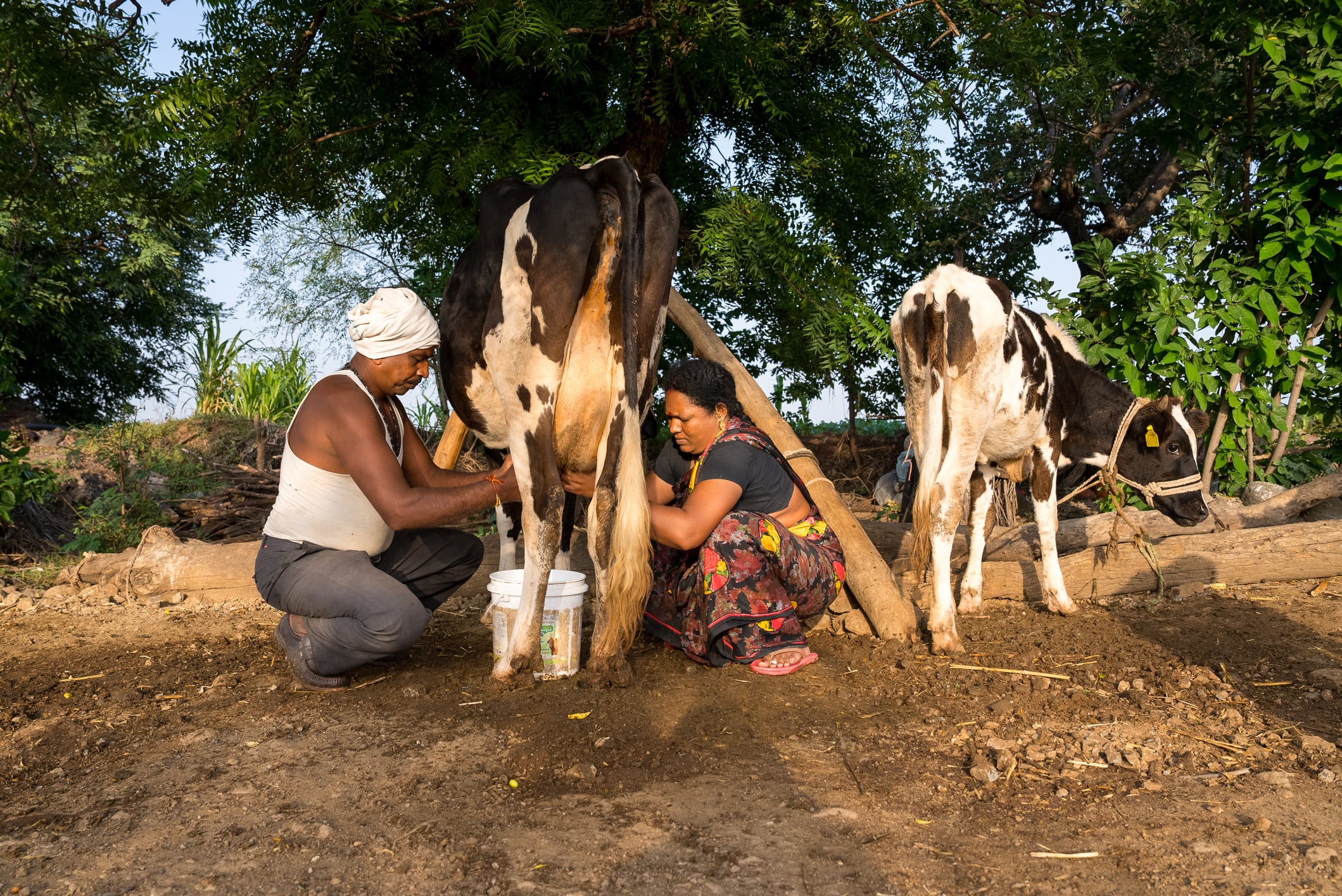If the Dairy Roadmap were a person, it would have the vote next year. These are the words of Dairy UK chief executive Dr Judith Bryans, an industry stalwart whose contribution to the dairy industry earned her the prestigious RABDF Princess Royal Award earlier this year.
Dr Bryans helms Dairy UK, the organization that represents dairy processors and co-ops in the UK and which has led cross-industry collaboration under the Dairy Roadmap to improve the sector’s sustainability credentials. The Roadmap is one of the industry’s longest standing initiatives and continues to evolve today.
“The Roadmap started with a ministerial roundtable at Defra,” Bryans recalled. “It was a meeting of many different agricultural sectors and the minister at the time asked all agricultural sectors to look at their environmental credentials, set targets, publish them, and work against those targets.”
The dairy sector responded by setting up the Milk Roadmap – but just a few years later in 2011, that turned into a much bigger project. “We realized it needed to be a full ‘dairy’ roadmap, and we have set and published targets ever since,” Bryans said.
More than 17 years later, the Roadmap has not only got the wider industry to act, but has led a data-driven approach to understanding the sector’s environmental impact. The results so far?
“80% of farmers are now carbon footprinting,” Dr Bryans said. “65% of dairy farm-managed land is under stewardship schemes; 40% of farmers are using renewables, and we’ve achieved 20% efficiency in water usage and energy usage. So a lot has been achieved in that time and the industry has continued working towards its targets and towards government targets.”
“Sustainability really has to be a partnership – and when it’s just farmers and processors, we can take it very far, but we really need the customers and other entities involved as well to truly accelerate what we want to do and where we want to go.”
Dr Judith Bryans, Dairy UK
By customers is meant retailers, manufacturers, foodservice and other stakeholders. With them onboard, there is renewed confidence that the sector has ‘a bright future’, Dr Bryans told us. “Both in the UK and globally, there’s a nutrition opportunity and a growth opportunity,” she added, “but with that comes the need to increase our climate change credentials.”
Steering change
So how does the Roadmap – which is being re-launched with an updated governance structure – work?
Tasked with the leading strategic direction is the Steering Group: comprising the AHDB, Dairy UK, NFU, Arla Foods UK, Dale Farm, First Milk, Müller UK & Ireland, Lactalis UK & Ireland, McDonald’s Morrisons, Sainsbury’s, Sysco GB and Tesco. Bas Padberg, MD of Arla Foods UK is the chair of the Dairy Roadmap.
Then there’s the Advisory Group, which involves the academia, non-profits, financial institutions and government bodies.
There are two forums: the Stakeholder Engagement forum (which engages industry stakeholders) and the Value Chain forum (which fosters collaboration with wider supply chain stakeholders).
Relevant experts partake in working groups to drive the many different facets of sustainability, from water management to carbon footprinting.
And finally, a Coordination Committee ensures broad alignment is achieved.
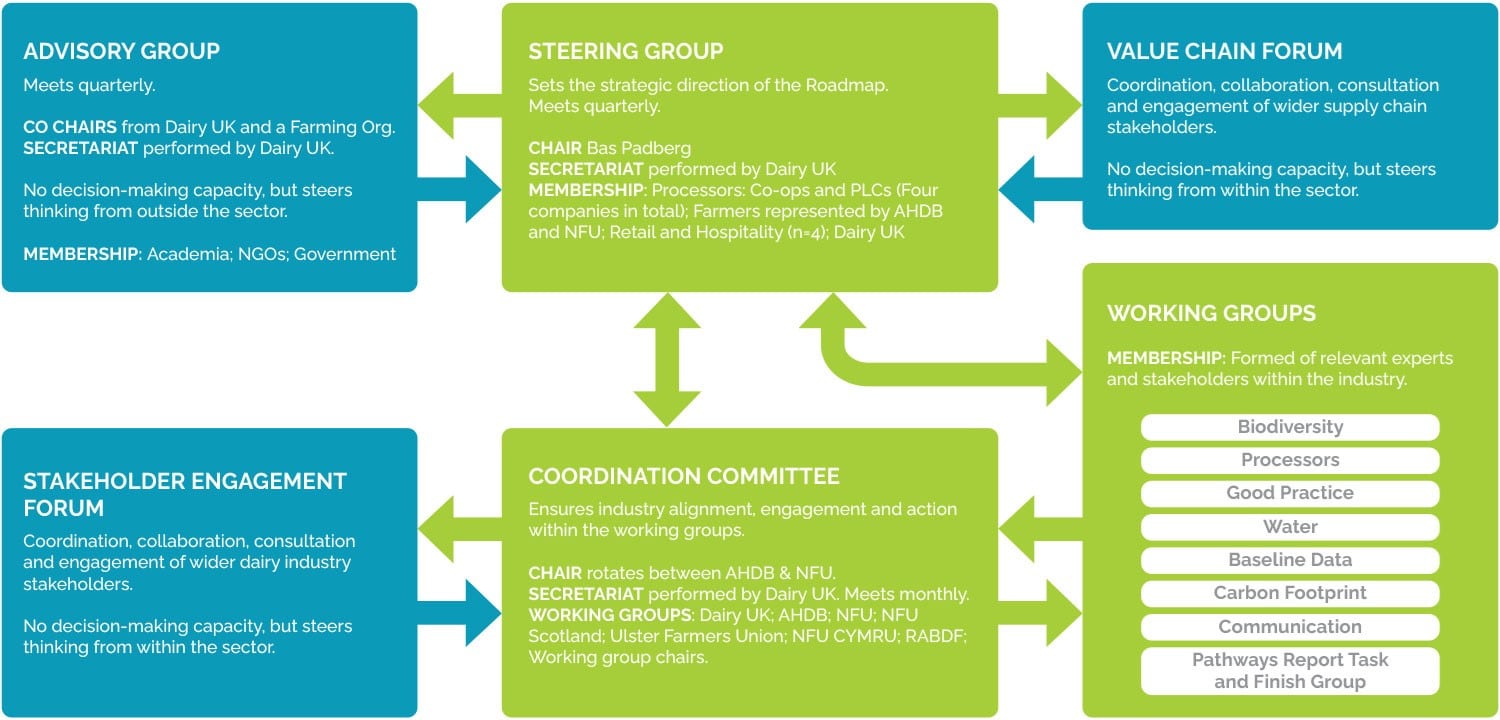
“The Steering Group will be the accountability group, but there are many other opportunities within that structure for different stakeholders to get involved,” Bryans told us. “This new structure is extremely inclusive and we’re open to listening and we’re open to partnership – but we have to recognize that the farmer has to be at the heart of this.”
“Having everybody in there is wonderful because it means we’re all learning from each other, we’re all moving together, we’re all agreeing on the priorities and we’re all pursuing the priorities. We know where we want to get to and we’ll get there.”
Dr Judith Bryans, Dairy UK
Policy like ‘shifting sand’ threatens progress
When it comes to transitioning to sustainable practices, funding is key, but in the UK, key sustainability schemes have been rolled back, particularly the now-paused Sustainable Farming Incentive.
“The agricultural landscape [in the UK] is really complicated because agriculture is devolved,” Bryans explained. “In addition to there being lots of policies and policies change, there’s different ways that those policies are being tackled in the four nations.
“There is a challenge around continuous changing policies and funding being available in some parts of the UK and not in others from a government perspective.
“That makes people want to look and see, well, if I jump into this and it shifts in six months or a year, what’s going to happen to the investment that I made?”
Still, there are enough producers enrolled in environmental schemes that the goal is to keep ahead of some of the policy, she added. “But there’s certainly disparity in the policies around the UK, and the policy shifts, it’s almost like shifting sand; it doesn’t make it easy.”
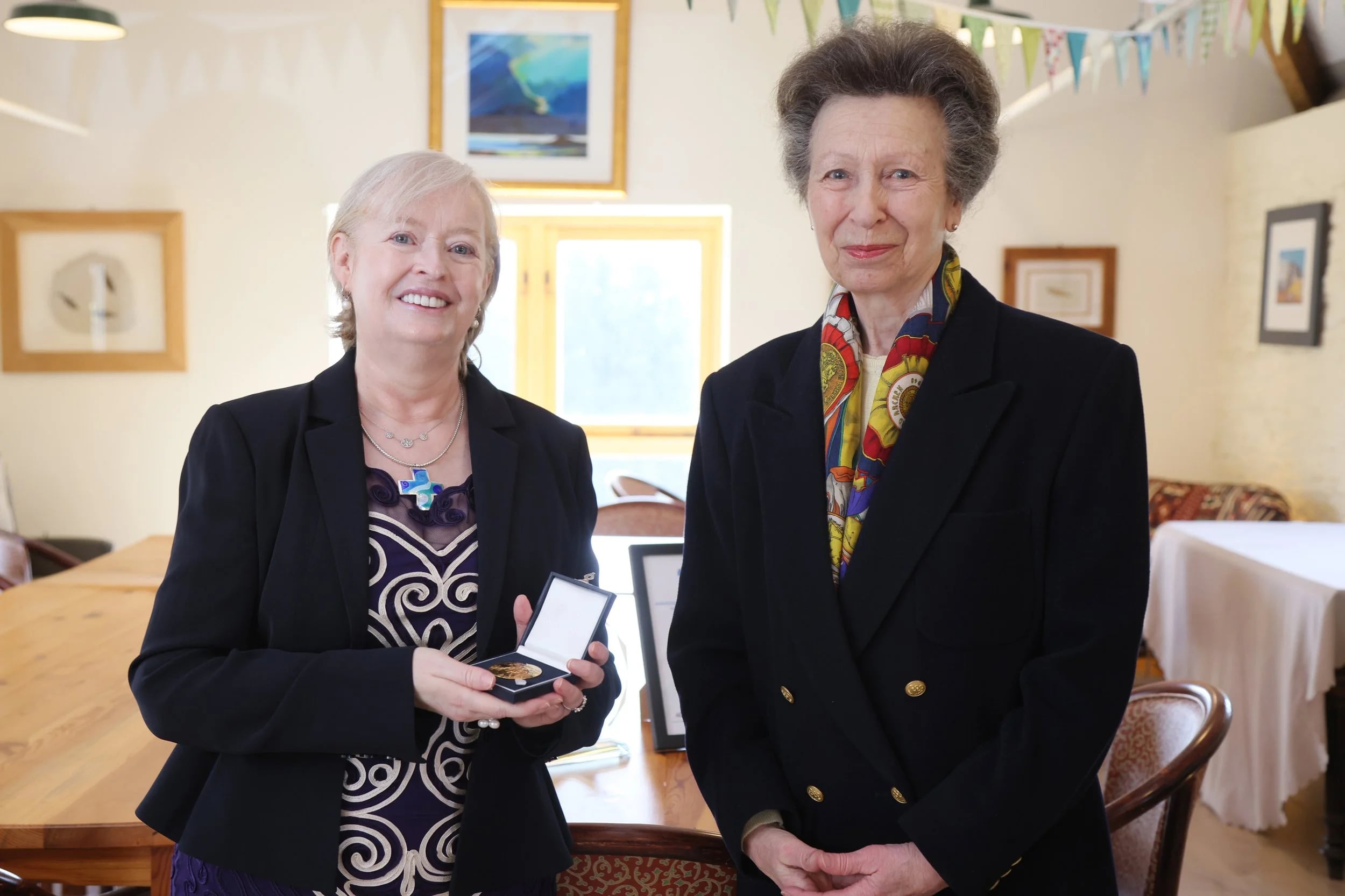
But policy changes also present opportunities for dairy to showcase its progress: for example, it’s data-driven approach. The sector has started aggregating anonymized data on parameters such as animal health, welfare, genetic merits and productivity from 5,000 farms, we were told. This data is comparable and will be extended to all parameters within the Roadmap to help inform sustainable management strategies.
It will also inform the first section of the Pathways report, to be published in 2026 and cover the period to 2030, with a second section extending to 2050. The Pathways report will highlight the funding and innovations needed, from AI-powered technologies to various on-farm interventions and financial tools, to help drive the industry’s sustainability goals.
Tackling misinformation
But is dairy getting the message about its sustainability work across to the consumer? While there needs to be a story to tell, communication has to be approached carefully, Bryans told us.
“We are very mindful that we’re in a world where it doesn’t matter to some people whether they’re given the correct information,” she said. “There was so much misinformation around Bovaer and one of the scary things about it about it was it was global misinformation.”
“In a changing world of social media where extremists often have the largest share of voice, we have to stand on science and what’s behind it.”
Dr Judith Bryans
“Our challenge is how we communicate all the changes in a way that’s relevant to people and how we deal with those conspiracy theorists in the future.”
Bryans also wants policymakers globally to consider dairy’s nutritional and environmental impact holistically.
“A lot of the reports that we’re seeing coming out around the world that people are potentially making policy on are built on very narrow environmental parameters: and they make almost throwaway comments about reduction in consumption of dairy, not on making sure that there’s adequate nutrients for the population. As well as judging a food on its environmental impact, it should be judged on its nutritional impact,” she said.
“If you take that nutrient density concept, you’re looking at both sustainability and environment, and dairy is a really nutritious food; it’s produced in an increasingly sustainable way, and it’s affordable and culturally acceptable.
“The world needs more dairy and it needs that dairy to be more efficient to be more sustainable.”
Climate Smart Food: Understanding climate risks
Want to know more about how the food and beverage industry can futureproof itself against climate change? Check out FoodNavigator's Climate Smart Food broadcast series.
Taking place September 9, 16 & 2 3, Climate Smart Food is a free webinar series designed to inform food and beverage manufacturers about how to tackle climate risk with real-world strategies: from smart farming and resilient ingredients to low-impact packaging and emissions reduction. Viewers will hear from industry leaders and innovators from organizations like Nestlé, ING Bank and Heineken UK.
Climate Smart Food will also be available on demand if you are unable to join on the day - but make sure you register for free to gain access.
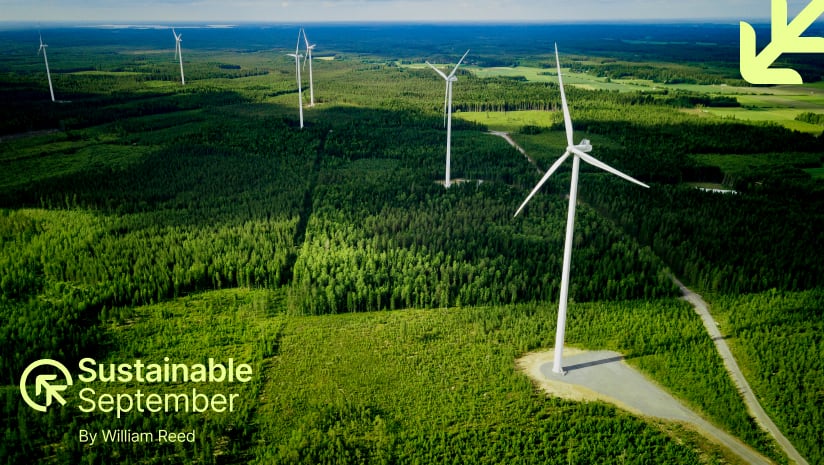
We want to hear what you think! Take our short, anonymous sustainability survey - and we'll make a donation to Farm Africa
Is the food and drink industry doing enough when it comes to sustainability? Where are the causes for celebration - and what are the challenges and concerns?
We want to know what you think! This short, anonymous poll will take just a couple of minutes to complete: yet your thoughts will help us take a global pulse check of what matters most as we look to shape a more sustainable future for the F&B industry.
And for every survey completed, we'll make a donation to Farm Africa: a charity that reduces poverty in eastern Africa by helping farmers grow more, sell more and protect the environment for years to come (up to a maximum amount).


